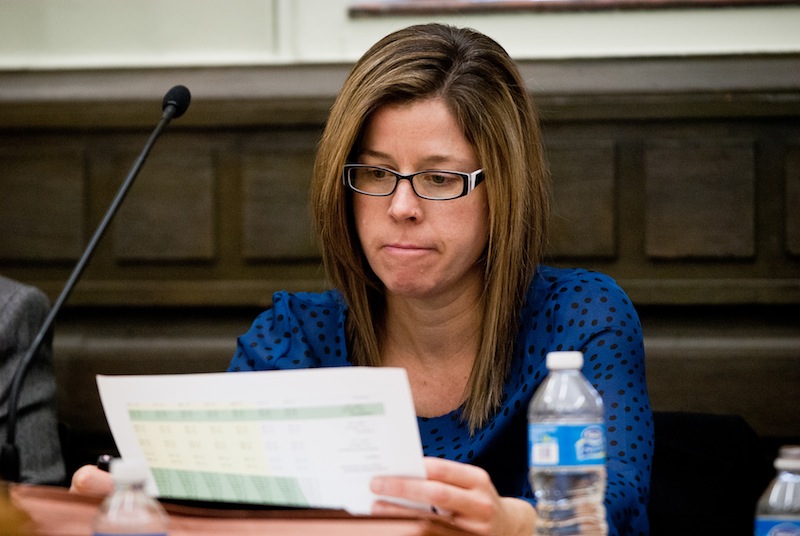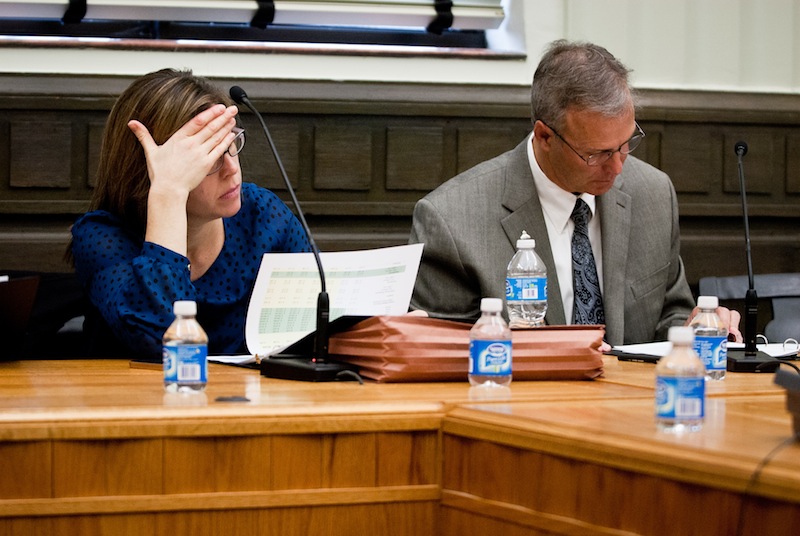
Crunch time again: Despite rising property values, Asheville City Council members found out that the city still faces a struggle to break even. Here, Vice Mayor Esther Manheimer reviews water fees and costs at the finance committee meeting. Photos by Max Cooper
Three City Council members got a glimpse of Asheville’s financial future Feb. 12 as they heard the first public report on the state of the city's budget.
When the Buncombe County Tax Department announced recently that its revaluation showed a 2 percent increase in property values in the city, Council members stayed mum, citing the need for more information from staff. That data came in the form of a report to Council's Finance Committee in advance of that evening’s formal session.

Initially the increase seemed like good news for the cash-strapped city government, promising new revenue if Council opted to keep the property-tax rate at the current 42 cents per $100 of assessed value. Taking that tack would bring in an estimated $1 million a year in additional revenue. But it would also make many residents’ tax bills rise. That’s something Council has gone to considerable lengths to avoid — especially in an election year (for more information on this situation, see the Feb. 12 online report, “Asheville City Council's Tax Dilemma,” at http://avl.mx/q8). Neighborhoods such as downtown and West Asheville saw sharper increases in property values.
To sidestep that kind of “sticker shock” for residents, local governments often resort to a “revenue neutral” approach. The tax rate is scaled back so the total amount collected remains about the same, except for what’s called “natural growth”: increases due to new construction and improvements to existing property.
But the city shouldn’t count on that new revenue just yet, cautioned Lauren Bradley, Asheville’s director of Finance and Management Services. “This calculation is preliminary: It will probably come down a little bit” as residents appeal their new assessments, she pointed out. The city may end up with about $750,000 in new property-tax revenue, Bradley predicted.
Meanwhile, the cost of everything from fuel to transit to health care has continued to grow, which could leave the city once again struggling just to break even, she noted.
“If all of these [costs] are built into the base budget, expenses would exceed revenues, and we would have to cut expenditures or raise revenues,” Bradley warned, though she later said the city won't know for sure until sales-tax-revenue figures come in later this month.
And while some city debt will be retired, she continued, “There still won't be a lot of wiggle room: There's not much to talk about in terms of new projects.”
Yet another potential wrinkle is future state legislation that could further weaken the city's financial position, said Bradley. A proposal to abolish local business licenses would cost Asheville roughly $1.7 million per year, and the proposed transfer of water system management to the Metropolitan Sewerage District would lop at least $1.8 million in annual revenues from the city’s budget.
After Bradley's presentation, the three committee members (Vice Mayor Esther Manheimer and Council members Marc Hunt and Chris Pelly) asked technical questions but made no comment.
“Expenditure pressures are still growing at a faster rate than the revenues are,” Bradley told Xpress after the meeting. “There's a lot of unknowns; it's still hard to estimate. We're already working on further belt-tightening strategies. We don't expect our revenue mix to improve anytime in the near future.”
A special Council work session is slated for late March, with staff’s recommended budget due in April.
David Forbes can be reached at 251-1333, ext. 137, or at dforbes@mountainx.com.



Before you comment
The comments section is here to provide a platform for civil dialogue on the issues we face together as a local community. Xpress is committed to offering this platform for all voices, but when the tone of the discussion gets nasty or strays off topic, we believe many people choose not to participate. Xpress editors are determined to moderate comments to ensure a constructive interchange is maintained. All comments judged not to be in keeping with the spirit of civil discourse will be removed and repeat violators will be banned. See here for our terms of service. Thank you for being part of this effort to promote respectful discussion.